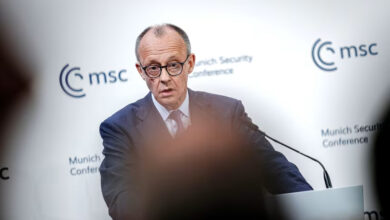The European Union's foreign policy chief urged caution on Saturday about a Franco-British drive to lift an EU arms embargo to help rebels in Syria, questioning the impact such a step might have on attempts to reach a political settlement there.
Other EU governments rebuffed efforts by Paris and London at an EU summit on Friday to lift the Syrian arms embargo to help opponents of President Bashar al-Assad, although they asked foreign ministers to discuss it again next week.
EU foreign policy chief Catherine Ashton said the EU needed to think "very carefully" about French and British arguments that lifting the embargo would encourage Assad to negotiate.
The EU should also consult U.N. mediator Lakhdar Brahimi and Moaz al-Khatib, head of the opposition Syrian National Coalition, about impact lifting the embargo might have on their efforts to start talks to end the Syria crisis, she said.
"What we've got to make sure of is anything we do does not make that (work) harder," she said, speaking at a conference organized by the German Marshall Fund of the United States, a group committed to strengthening transatlantic cooperation.
Germany led opposition to the Franco-British move to lift the embargo to help the rebels after two years of civil war that have killed 70,000 people, according to U.N. estimates.
Opponents argue that arming the rebels could encourage Assad's backers, Russia and Iran, to step up weapons deliveries to the government, fuelling an arms race, and they also fear that weapons could fall into the wrong hands, such as Islamist militants in the rebel ranks.
Ashton said she had told EU leaders at Friday's summit that they must think through very carefully the implications of lifting the arms embargo.
"Would putting weapons into the field make it more or less likely that others will do the same? What would be the response of Assad based on what we know about his response so far? Would it stop people being killed or would it kill people faster?" she said.
Although Ashton did not mention it, Western governments are concerned about chemical weapons the Syrian government is believed to hold. U.S. President Barack Obama has warned Assad he would be held accountable if such weapons were used.
EU diplomats think it is unlikely France and Britain will be able to persuade its EU partners to back lifting the arms embargo to help the rebels, a decision that needs unanimity. But a compromise allowing some increased aid to Assad's opponents might be possible before current sanctions expire on June 1.
Ashton, a Briton, said there was "no possibility" of her staying on for a second term as EU foreign policy chief after her five-year term expires at the end of next year.
"It needs to go to someone else now," she said.




